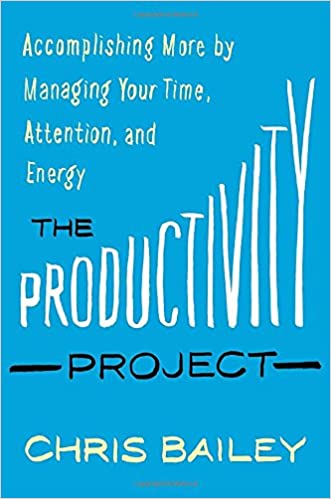
The Productivity Project
Rating: 8/10
Author: Chris Bailey Read The OriginalHigh-Level Thoughts
Chris Bailey is productivity guru, and this book encompasses all his past experiments, research he has conducted, and knowledge to help you become the best possible version of yourself. As someone who is a nerd for books like these, I knew a lot of what was covered but I picked up a couple of tricks and tips that I apply daily in my life that helped me crank up my output a fair amount. But the most important take away from the book is to remember that it's not how much you get done, but what you get done.
Productivity Project Summary
Three Daily Tasks
- At the beginning of the day, picture the end of the day and ask yourself: When this day is over, what 3 things will I want to to have accomplished. Write them down.
- Do the same thing for the beginning of each week.
Your Biological Prime Time
- Depending on your genetics you should schedule your hardest most difficult tasks when your energy levels are at their peeks.
- In order to discover when your prime time is, for one day keep a log of how much energy you have throughout the day and cut out all caffeine, heavy meals, and sugar. (This is your baseline)
Regain Control Over Your Brain
- 1. Create a procrastination list
- Whenever you find yourself procrastinating have a list of other tasks to do such as answering important emails, and organizing.
- 2. List the costs
- 3. Just get Started
Why the internet is killing your productivity
- Study shows that people waste around 47% of their time on the internet procrastinating.
- "The internet hijacks your limbic system by overwhelming it.The internet tempts us to work on lower-impact tasks. Though we are technically working when we do things like continually check our email, we're not as productive, because we don't accomplish as much through those tasks."
- If you want to become more productive, managing our time should come second to how you manage your energy and attention.
- Don't confuse busyness with productivity.
- Batch low value but unavoidable tasks like cleaning, doing laundry, or grocery shopping all in the same day.
Shrinking the unimportant
- Set limits to tasks such as attending meetings, email and social media
- Parkinson's law -> work expands as to fit the time available for its completion.
- Emails should be processed not checked
- Hire your virtual assistant if you value your time enough and believe you can outsource certain tasks.
- "our brains are built for solving problems, connecting dots, and forming new ideas—not for holding on to information that we can simply externalize."
- Zeigarnik effect -> incomplete or interrupted tasks weigh on our mind much more than completed tasks.
Rising Up
- "While no one acts in accordance with their values all the time, the most productive people act in accordance with their values in the long run[The most productive people] make course corrections every week to gradually get better at everything they do."
- Look at your projects from a 30,000 feet point of view and group them into "hot spots"
- Mind
- Body
- Emotions
- Career
- Finances
- Relationship
- Fun
- "[O]ur mind seesaws between two modes throughout the day: a "wandering" mode, which we experience when we're taking a shower, and a "central executive" mode, which we experience when we're on our smartphones or focused intently on something."
- We have our light bulb moments when we are usually in wandering mode, which is why you should carve out times throughout the way to practice it.
- Use meditation to sharpen your attention muscle and get more out of your time. Meditation creates more attention space around the present moment, so you can focus completely on what you're doing.
Diet, Exercise, and Sleep
- Drinking alcohol is the same as borrowing energy from tomorrow.
- Drinking caffeine is the same borrowing energy from later on in the day because you will eventually experience a crash.
- Be strategic with your caffeine intake, Drink it before doing focused work, and keep in mind that there will eventually be a crash and also avoid drinking it at least 8 hours before going to sleep.
- Sleep is essential for staying productive, but it doesn't matter when you wake up, it's what you do during your waking hours that is most important. Find the best wake up time that works for you and stick with it.
- When you exercise, your brain releases BDNF (brain-derived neurotrophic factor), a chemical that helps you create new brain cells and also boosts your mood.
- "Our bodies are built to walk five to nine miles every day to hunt and gather food, not to spend fifty-two hours staring at screens every week."
Conclusion
The Happiness Advantage (book) -> when your brain is happier, it "performs better than it does at negative, neutral, or stressed.'
"Productivity is often a process of understanding your constraints. Productivity techniques exist to help you work smarter. But they're only useful when you still do the work."